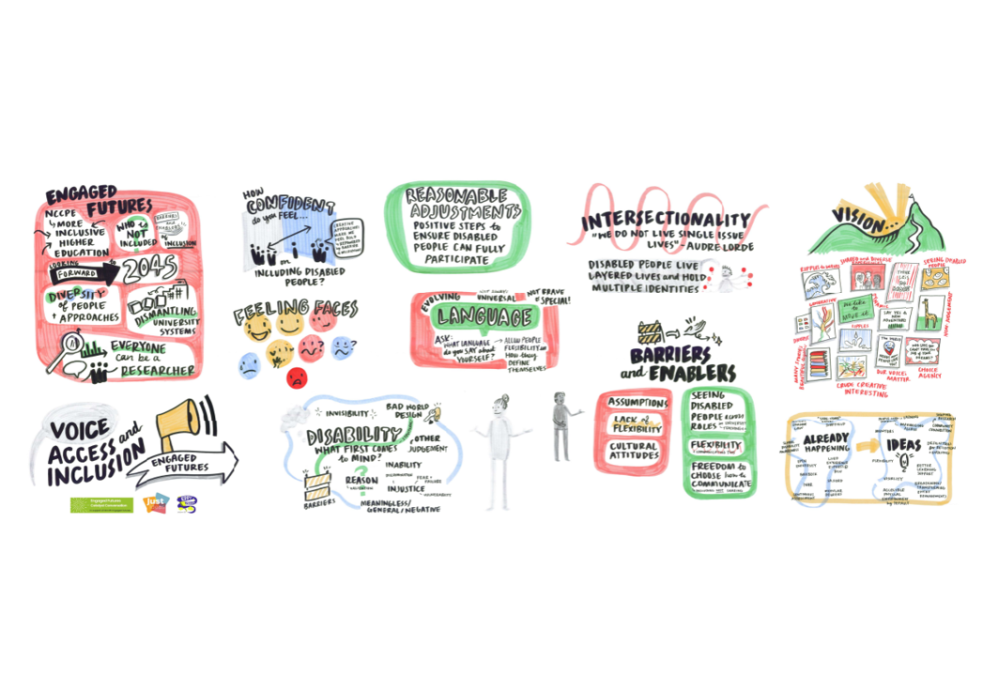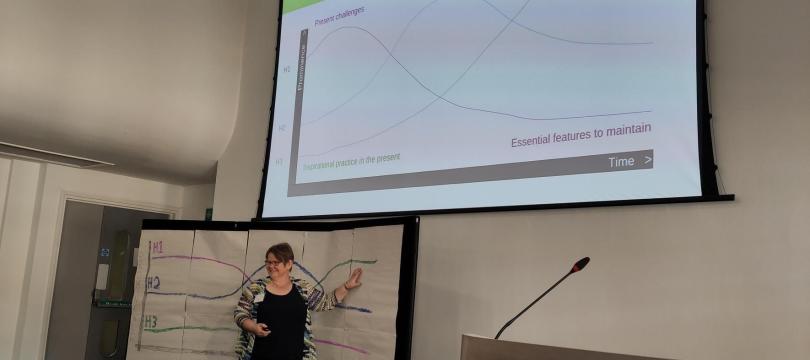Catalyst Conversations: Reimagining Higher Education for 2045
With rapidly changing expectations about the relationship between knowledge creation and society, as well as the significant financial uncertainty faced by the sector, we are working to imagine new futures for higher education in the UK.
We recruited over 230 Catalysts who have been working with us to envisage a future for the sector where knowledge is built openly and inclusively; and the role and position of universities in society is reimagined. We are entering phase 3 of this work, entitled, Engaged Futures, where we will be exploring actions needed to realise these futures.
In the final stages of Phase 2, we were delighted to support some of our Engaged Futures Catalysts in hosting new conversations. NCCPEs Sian Aggett and Alison Wright reflect here on how these conversations have connected us with people and networks we hadn’t yet reached through our Engaged Futures future visioning exercise. This exercise follows a Three Horizons approach, which you can learn more about here:
To create an inclusive future, we need an inclusive visioning process and to hear from a diversity of people. Supporting Catalyst-led activities have been an opportunity to address gaps in the conversations that the NCCPE had been convening, inviting in perspectives from a greater diversity of people, all with an interest in an engaged and inclusive future higher education system.
The conversations took a variety of forms including nationwide online conversations, in person design led workshops and more intimate chats over food.
This feedback offers powerful snapshots of the futures we can work towards. These futures centre care, creativity, access and collaboration and illustrated that with concerted action a new horizon is within our collective reach.

No longer fit for purpose (Horizon 1)
Across conversations, there was some consensus in the features of the current system that are no longer fit for purpose (Horizon 1) which included:
- A Disconnect Between Universities and Communities
- Structural Barriers to Inclusion: Admissions practices, financial pressures, and underrepresentation of racialised, disabled and minoritised groups reinforcing social inequality.
- Inflexible Pedagogy: Curricula and teaching methods which are ‘Eurocentric’, outdated and misaligned with diverse learning styles and experiences.
- Tokenistic Engagement: Community participation often lacked recognition, payment or genuinely shared decision-making.
- Neglect of Wellbeing and Care Work: Across all areas of the university’s work, emotional labour and pastoral support is often undervalued and under supported.
Possible futures (Horizon 3)
Conversations then explored what an alternative future free of these characteristics might look like (Horizon 3 in the Three Horizons process). Looking forward 20 years, nearly all participants identified an increase in how universities embed themselves in the local place and civic life. Building on a foundation of long-term trust, institutions will conduct work that is shaped by community needs or support work that is community-led. This will be enabled by governance and funding structures that allow for shared authority and fair collaboration. Sitting above all of this, our participants identified a need for legislation and structures such as citizen’s assemblies and transparent impact monitoring to ensure accountability and integrity rather than tokenistic practices. Just some of these ideas are outlined below.
Addressing marginalisation
A few explored how to achieve cultures of belonging rather than exclusion. Helen Garforth & Esther Oenga with ‘Just Ideas’ led a workshop with graphic notetaker (see image) entitled ‘Voice, Access and Inclusion’. They reimagined the university as a place that people with disabilities can aspire to visit, study and work without barriers to access. This group saw possibility in regenerative, nature-based learning spaces and ecological and inclusive design.
Sarah Hayes from Bath Spa Universities convened university leaders, business and community organisations to explore how universities could better involve racially minoritised and disadvantaged communities in regional innovation. They explored ways of supporting Ethnic Minority Businesses (EMBs) through mentorship networks. Whilst Adam Cheyo, from Buckinghamshire County Council, convened African diaspora community members in a face-to-face session to explore their perspectives of the barriers to higher education for racially minoritised young people and what would help them to experience belonging in the higher education system. Greater visual representation of marginalised groups, a decolonised curriculum, and greater support once within a university education were some of the actions identified.
Lewis Hou held an online gathering with isolated Scottish communities who wanted to challenge extractive research approaches often led by researchers from outside of these communities. Instead, they are putting serious thought into how to nurture more community-led knowledge generation and infrastructure where lived experience is central.
Teaching and learning reimagined
Some conversations delved into transformative and decolonised approaches to learning and teaching. Justine Kenyon at the University of Westminster ran a workshop with students and educators in which they used design approaches to reimagine teaching. In their vision, pedagogic approaches prioritise flexibility, authenticity and accessibility. They see a role for AI in personalised learning support including real time language translation. They also suggest an education system that doesn't grade students but gives them real world problems to tackle in practical ways. Emily Bastable at Knowledge Exchange UK also explored the potential future for teaching. In the conversation that she led participants envisaged approaches in which students are key actors in an institution’s engagement work and knowledge production.
Engaging better
Hannah Yelin and Laura Clancy led an online conversation, grounded in survey and interview data, to explore the systemic risk experienced by researchers in conducting public engagement and what more supportive environments for research in 2045 could look like. They call for greater attention to research culture and mechanisms and processes to better support and protect staff, especially those most marginalised and vulnerable professionally and societally.
Collaborating with communities
At the University of Wolverhampton Martin Khechara brought together activists, academics and widening participation specialists to consider how HE institutions could foster deeper social connections with the world outside their walls. Camilla Irvine-Fortescue from Heriot-Watt University’s Public Engagement Team hosted drop-in conversations with local Edinburgh residents about how they might better connect with nearby communities. Ideas included microgrant schemes to support local initiatives and drawing more on social media and digital platforms like Tik Tok.
Ellen Care at Collaborate CIC facilitated an online workshop with 11 partners from across Durham including Durham University, Durham County Council and Durham Community Action to explore place-based research collaboration which would draw in representatives from across professional sectors. They suggest approaches that are relationship centred, and which reward strong collaboration rather than research outputs. They also call for mechanisms that can help local actors identify community priorities. This was echoed by Joanne Hutchings from Public Health Wales held two workshops examining how funding and decision-making structures might be transformed for greater collaboration between universities and communities. Suggestions drawn from these conversations again called for Welsh universities to connect back to their community-led origins and for stronger infrastructure for cross sector collaboration.
Final Reflections
Whilst every conversation brings something new to Engaged Futures, they also add strength to what we feel is the right direction of travel. But the conversations don’t stop here. All the findings from these conversations will be feeding into Phase 3 of Engaged Futures and will inform us as we develop ‘Domains of Action’. There will also be chances for further Catalyst input.
If you are not already a Catalyst please consider joining us. We are keen to work with anyone who has an interest in the future of the higher education sector and how universities engage with society. Whether you are involved within the system of higher education, or working or living with or alongside universities, we would be keen to have you join us in this collective movement for change. Engaged Futures - Catalyst Group | NCCPE].

